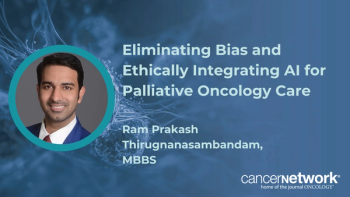
Many Unanswered Questions About Risks for Contralateral Breast Cancer Led to CARRIERS Study, Says Expert
An expert from the Mayo Clinic explains why he and his colleagues are researching risk factors for contralateral breast cancer in carriers of moderate-risk genes such as ATM, CHEK2, and PALB2.
What role genetic germline pathogenic variants play in the risk for developing contralateral breast cancer—a second cancer following the first invasive breast cancer—is an important question to answer, according to Siddhartha Yadav, MD, MBBS, a medical oncologist and assistant professor of Medicine and Oncology at Mayo Clinic in Rochester, Minnesota.
During the
According to Yadav, there was not a well-defined understanding of how germline mutations in ATM, CHEK2, and PALB2 affected the risk for contralateral breast cancer, which investigators of the study aimed to address. He also said that investigating other potential factors such as menopausal status was important in the context of germline mutations.
Transcript:
Our understanding of breast cancer risk in germline mutation carriers is primarily really limited to BRCA1 or BRCA2 mutation carriers. And for some of these moderate-risk genes, such as CHEK2, ATM, or PALB2, we don't really know what the contralateral breast cancer risk is. In addition, a lot of different other factors such as menopausal status as a diagnosis have not been investigated comprehensively in the context of contralateral breast cancer risk in germline mutation carriers. So, we wanted to create an unbiased population-based study to look at contralateral breast cancer to answer some of these questions, including [those] for moderate-risk genes, [and] also for BRCA1/2. Answering these questions in a population-based setting was important.
Reference
Yadav S, Boddicker NJ, Na J, et al. Population-based estimates of contralateral breast cancer risk among carriers of germline pathogenic variants in ATM, BRCA1, BRCA2, CHEK2, and PALB2. Presented at the 2022 San Antonio Breast Cancer Symposium; December 6-10, 2022; San Antonio, TX. Abstract GS4-04.
Newsletter
Stay up to date on recent advances in the multidisciplinary approach to cancer.











































